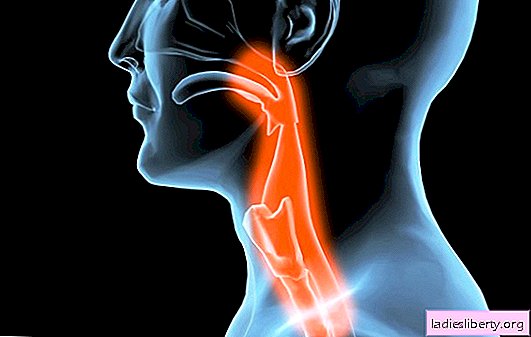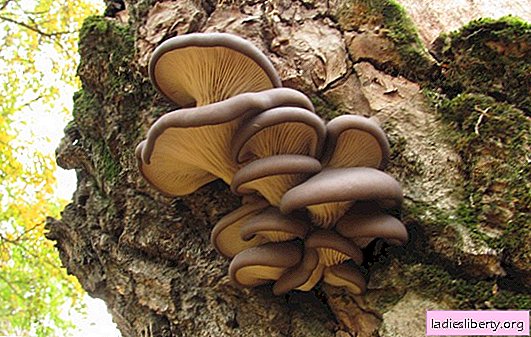
Inflammation of the esophagus or esophagitis is a disease in which the mucous membrane of the human esophagus is affected.
This can happen for a variety of reasons.
Consider in more detail the symptoms of inflammation of the esophagus and methods of treating this ailment.
Inflammation of the esophagus: causes
Usually inflammation of the esophagus develops for the following reasons:
1. Acute infectious lesions of the respiratory system, intestines (flu, SARS, fungal infection, diphtheria, etc.).
2. Injury to the mucosa during its diagnosis.
3. Damage to the esophagus when foreign objects enter it.
4. Thermal or chemical burn of the mucosa.
5. Inflammation as a result of the development of an allergic reaction to a food product.
6. The use of excessively hot or spicy food.
7. The use of spirits, which burned the mucosa and caused its inflammation.
8. Work related to inhalation of harmful fumes and dust.
9. The development of inflammation as a result of accumulation of food debris (it happens with various disturbances in the stomach).
10. Vitamin deficiency (acute deficiency of nutrients and trace elements in the body).
11. Prolonged intoxication of the body.
12. Colitis and other gastrointestinal diseases that are not treated.
13. Inflammation of the esophagus as a result of the influence of certain drugs.
14. Gastritis.
15. The ingestion of digestive juice in the esophagus, which irritates the mucosa and causes inflammation.
Inflammation of the esophagus: symptoms and signs
Esophagitis has two forms of course: acute and chronic.
Acute inflammation of the esophagus has the following symptoms:
1. The appearance of an acute pain syndrome, which is localized in the chest and gives to the neck, back and shoulder blades. Moreover, the pain itself can be so severe that a person will not be able to sleep and eat.
2. Increased salivation.
3. Severe heartburn, which is not eliminated by various drugs for this symptom.
4. Violation of swallowing.
5. Weakness.
6. Loss of appetite.
7. Irritability.
8. In more severe cases, the patient may experience vomiting with blood.
9. With the progression of the disease and severe pain, a person may experience a shock condition.
Chronic esophagitis has the following features:
1. The patient observes a frequent heartburn that occurs when eating fatty, spicy or hot foods. Heartburn also occurs with overeating.
2. Belching.
3. Nausea.
4. Digestion disorder.
5. The undulating course of the disease with periods of exacerbations.
6. The formation of scars on the mucosa of the inflamed esophagus happens if the disease is not treated within a few months of its course. In this condition, the patient will need a longer and more complex therapy.
7. Often, chronic esophagitis contributes to the development of respiratory disorders. Thus, the patient may experience asthma and pneumonia.
8. Pain in the chest and behind the back. The nature of the pain is aching, not very pronounced.
Inflammation of the esophagus: diagnosis and treatment features
If you suspect esophagitis, you should contact your gastroenterologist. After the initial examination and palpation of the abdomen, the doctor will prescribe such mandatory diagnostic procedures:
1. General clinical blood and urine tests.
2. Endoscopic biopsy.
3. X-ray of the esophagus.
4. Ultrasound.
Treatment of inflammation of the esophagus is selected for each patient individually, depending on the form of pathology, its cause and the general condition of the patient.
Traditional therapy for acute esophagitis has the following features:
1. If the cause of inflammation of the esophagus was a chemical burn, then the patient urgently needs to rinse the stomach and esophagus to clear the mucous membrane of the aggressive component.
2. Vitamin complexes are prescribed.
3. In the first two days of treatment, it is advisable for the patient to completely refuse food intake in order to give the esophagus time to “rest” and not to irritate him with food once again.
4. In the acute course of the disease, the use of the drug Famotidine is indicated.
5. During further treatment, the patient must follow a strict diet. It provides for a complete rejection of fatty, smoked, fried and spicy. Also, the patient should not drink alcohol and smoke.
The basis of the diet should be soft dishes, steamed or boiled. Coarse food needs to be crushed in a blender.
6. With severe intoxication of the body, the introduction of special detoxification solutions is prescribed.
7. In case of infection of the esophagus, broad-spectrum antibiotics are used.
8. If the disease is accompanied by the formation of an ulcer, then the doctor should prescribe analgesics for pain in this condition. In this case, washing the digestive system of the patient is impossible.
9. The patient should sleep on a high pillow so that the neck is raised. This will reduce pain and heartburn.
10. For heartburn, anti-inflammatory drugs and medications that lower the acidity of the digestive juice are used.
Treatment of chronic inflammation of the esophagus has the following features:
1. The patient needs to review his diet and enrich it with fiber, protein products, as well as dairy products. It is strictly forbidden to use sweet, salty, smoked and spicy. It is best if the new menu is agreed with your doctor.
2. The patient is shown taking medications that have a positive effect on the tone of the esophagus. Usually, sedatives and prostaglandins are used for this.
3. Antacids are indicated to lower the acidity of gastric juice. They must be taken for at least two months, alternating several drugs at once.
4. For pain, pain medication is prescribed. You can also use analgesics in the form of gels. They help with painful swallowing, as well as pain when eating.
In addition to drug therapy, for chronic inflammation of the esophagus, physiotherapy can be practiced. It provides for the following procedures:
1. Mud treatment.
2. Physiotherapy exercises.
3. Electrophoresis.
It is important to know, that with the development of bleeding and other complications, physiotherapy cannot be carried out. In this condition, the patient is recommended to re-examine as soon as possible and, if necessary, perform surgical intervention.
Usually, when the condition worsens, plastic is made of the esophagus or its resection. The recovery period after such surgeries is usually 2-3 months.
Inflammation of the esophagus: treatment, prevention, complications
If timely treatment therapy for inflammation of the esophagus is not carried out, the patient may experience such complications in the condition:
1. An abscess is a frequent complication of untreated esophagitis.
2. Stenosis of the esophagus may be accompanied by a violation of the passage of food into the stomach and a sharp decrease in the patient’s body weight.
3. Perforation. This complication is very dangerous, therefore, it requires immediate surgical intervention.
4. Barrett's disease is the so-called before cancerous condition, which, if untreated, can degenerate into oncological pathology.
5. An esophageal ulcer usually develops in advanced cases. It leads to a shortening of the walls of the esophagus and the appearance of rough scars in it.
To prevent the development of esophagitis, you should adhere to such prevention rules:
1. Avoid eating overly spicy, hot and oily foods.
2. Regularly conduct a preventive examination by a doctor.
3. In time to treat those diseases that can lead to the development of inflammation of the esophagus.
4. When the first symptoms of the disease appear, you should immediately consult a doctor and do not delay the diagnosis.
5. Stop smoking and drinking alcohol.
6. When working in hazardous conditions, a protective mask must be worn.
7. Do not eat foods that may cause an allergic reaction. It is also advisable to periodically drink a course of antihistamines, so that with possible allergies, its symptoms are not so pronounced.
With timely diagnosis and treatment, the prognosis for esophagitis is quite favorable. If the patient’s condition was started, he developed intra-abdominal bleeding, stenosis or other complications, then in this case the chances of a full recovery will decrease dramatically.











